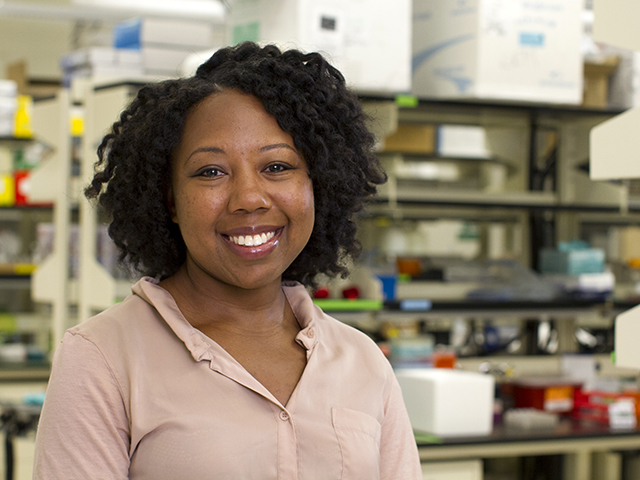
Haynes looks to create global resource for synthetic biology researchers

ASU assistant professor Karmella Haynes will lead a project to develop a vast database to aid researchers pursuing advances in synthetic biology. Photography by Jessica Hochreiter/ASU
An idea for accelerating innovation in biology and medicine has earned Karmella Haynes support from Women & Philanthropy, a philanthropic program of the ASU Foundation for A New American University.
Haynes is a synthetic biologist and an assistant professor in the School of Biological and Health Systems Engineering, one of the Ira A. Fulton Schools of Engineering at Arizona State University.
On May 6, Women & Philanthropy presented Haynes one of the annual grants it awards to fund work by ASU faculty deemed to have potential for solving some of society’s biggest challenges.
The award will provide more than $75,000 to support Haynes’ goal of creating a large online data and knowledge base on the behavior of synthetic DNA in living cells – one that would establish ASU as the epicenter of a global resource for researchers attempting to make breakthroughs in synthetic biology, a fast-emerging field that combines biology, mathematics, engineering and computer science.
Synthetic biologists engineer body cells by designing DNA – deoxyribonucleic acid, a basic building block of life – with the capability of instructing cells to act in various beneficial ways, such as detecting diseases and performing therapeutic functions.
“Synthetic biology has taught us how to deconstruct a gene so that we can use DNA modules, the various working parts of a gene,” Haynes explains. But what biologists don’t have is a single large repository of verified data that provides details on how DNA fragments of various kinds will interact when integrated into living body cells.
“What we care about is when you make a DNA sequence combining these fragments, how do you integrate these parts into a larger working system and what will happen when you do that?” she says. “How do these DNA parts control and interact with the cells into which you introduce them, and what does that integration produce?” she says.
Having such knowledge readily available would help researchers streamline their efforts to “find the recipes” for engineered DNA that would help fight diseases or provide other health and medicinal benefits.
For her project, called Synthetic Biology at ASU (SB.ASU), Haynes will collaborate with Catherine Seiler, an associate research professor at the ASU Biodesign Institute.
Seiler has developed DNASU, a large and growing repository of DNA parts, sequences and genome collections that are essential to many biomedical research efforts.
Scientists and engineers today can rapidly build DNA at low cost, but the development of bioengineered systems that are optimally effective remains relatively low, Haynes says.
SB.ASU would give researchers an archive of detailed information about the characteristics of DNA fragments and how they can be expected to behave when combined. Such knowledge could enable more rapid assembling of effective DNA sequences that will “provide the foundation for accelerated progress in synthetic biology,” she says.
To be designed “like an open-science crowd-sourcing” platform, SB.ASU would gather and organize information from contributing researchers throughout world to share knowledge about findings in synthetic biology that could prove useful “but don’t always make it into the research journals,” Haynes says.
Using synthetic biology techniques, researchers build what are essentially living machines that can be programmed to perform various life-sustaining tasks. “But unlike non-living machines that can be built step by step, biology is a constantly changing system, so engineering biological ‘machines’ that are effective requires a wide-ranging and sustained effort,” she says.
The SB.ASU project could play a big role in building and sustaining the momentum necessary to ensure significant progress toward solutions to major health challenges.
Haynes’s project proposal was one of four selected from among 37 proposals submitted to vie for this year’s Women & Philanthropy awards.
Women & Philanthropy is one of three engagement programs housed within the ASU Foundation for A New American University, which raises and invests private support for ASU.
Women & Philanthropy grants are generated from the individual contributions of investors, who now number 255. Each member’s annual contribution is pooled with others to allow the group to have a greater investment impact on ASU programs and scholarships.
Since 2003, Women & Philanthropy has awarded $2.57 million to 71 ASU programs and initiatives in four categories: education innovation, community outreach, student scholarships and health care.
Speaking about this year’s winning project proposals, Women & Philanthropy investment co-chair Miriam Waltz said, ““You can be confident that the programs really do represent academic excellence and that they will make an impact.”
Media Contact:
Joe Kullman, [email protected]
(480) 965-8122
Ira A. Fulton Schools of Engineering



































